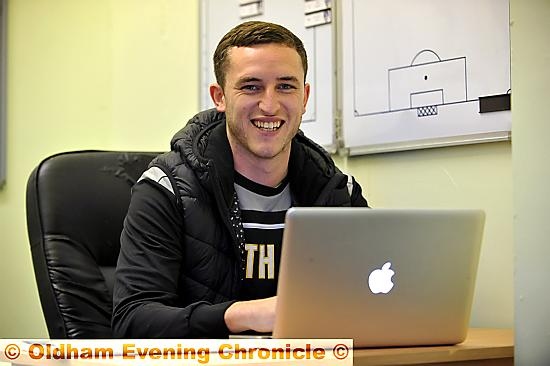Hart of the matter
Date published: 26 November 2015

Tom Hart
Management team benefit from instant feedback
TOM Hart flies down the main stand stairs with his laptop and goes straight into a meeting in the manager’s office.
David Dunn looks at the carefully clipped-together footage of the first half’s key moments, along with assistant Dean Holden and first-team coach Keith Brown, as Athletic’s players sit on the dressing room benches at half-time behind the door nearby.
What have Athletic done well in the opening 45 minutes? Where can they be better and what weaknesses have been exploited in the opposition?
All the relevant information is there on the screen, on a computer that has been fed the match footage directly from the club’s own camera.
CONSTANT
Manager Dunn watches on and listens, talks to his backroom team, assesses the plan for the second half and only then addresses his side.
“It could be Dean seeing something I haven’t and saying, make a clip of that,” said club analyst Hart, who sits high up in the stands during matches, where he is in constant contact with Holden through a radio microphone and earpiece.
“Or it could be me making a clip of something he hasn’t seen then showing him at half-time.
“We do have a look at things and have a discussion before the manager goes and addresses the players.”
Joe Royle never had this technology. Back in his day, there was no opportunity to piece together in-game footage on the fly, nor indeed scout the opposition's previous games with the click of a mouse button or take a look at a potential player in action for his club side in the Belgian third division.
Nor would he send out email links on Saturday evenings for his players to download and watch at their leisure the following day.
The game has changed. Hart, a sports coaching graduate of the University of Central Lancashire, stresses that being blinded by science is the last thing anyone needs.
The key to modern-day analysis, he says, is to give players only the vital snippets that can help them and their team, and nothing else.
“It is important you don’t overload them with too much information,” he said. “If it was a poor performance, we could sit and talk about it for hours. But we need to single out the most important points to feed back to the players.”
Some managers are more receptive than others, too.
“I would like to think that ever since David Dunn came in, the process has been a lot more
fluent,” Hart added. “The way we evaluate the games, it goes back to what the game plan was.
“The analysis not only relates to the performance, but also how we originally perceived the opposition’s strengths and weaknesses to be.
“We relate it all back to that plan and also what our principles are, regardless of who we are
playing, and how they came out in the match.”
EXPERIENCE
It was only when he was at university that Hart started to realise how big performance analysis was getting.
A chat with a lecturer led him to realise he needed to set himself apart from his classmates and led him to gain experience working in analysis with AFC Fylde in 2013-14, with the club going on to gain promotion to the Conference North.
An association with Blackpool FC Ladies would take up his Sundays and there was also work on hand with the Wales women’s national team based in Preston.
Hart was recommended for an internship at Bolton and spent two months there before the Athletic job came up in September, 2014.
“How many 21-year-olds do you see working in football clubs, with the likes of David Dunn and Dean Holden, or Lee Johnson and Darren Kelly?” said Hart. “The experience is invaluable.”
At such an age, it is inevitable that some more traditionally minded players won’t take kindly to the assistance he offers.
“If they don’t want it, they tell me,” Hart says. “I won’t change a 35-year-old’s mentality. But if they do want to, I do think it will help them.”
And as far as putting together a successful plan for the team, Hart points to the Swindon home game back in February as a shining example of pinning down and then making the most of opposition weakness.
He added: “It was a highlight, coming up with a game plan that really worked. It was superb that day. We knew what we had to do and we did it.”
Most Viewed News Stories
- 1‘If you jump into two trams you know what you are doing - I am against protecting fools’
- 2New plans for HMO hotspot in Chadderton slammed as ‘irresponsible’
- 3Man charged following probe into a series of burglaries across Oldham and Tameside
- 4Oldham Poundland store closes
- 5Two more people arrested as police step up patrols in Oldham town centre




